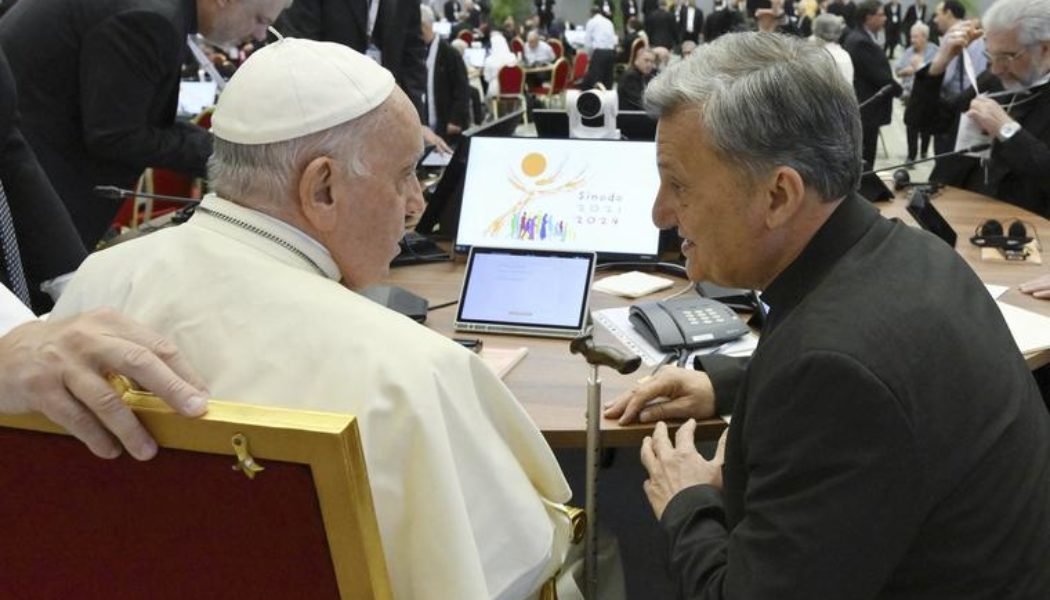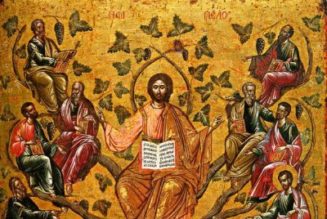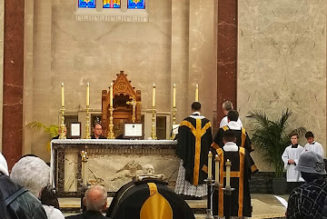
The recently convened Synod on Synodality at the Vatican has raised expectations among some Catholics that the Church is going to overhaul its traditional moral theology with an eye toward changing certain teachings that pertain to human sexuality.
There are other issues in play as well, such as the ordination of women to the diaconate and/or the priesthood, but my focus here will be on the question of sexual morality in particular.
Pope Francis has warned that the Synod is not to be treated as a kind of parliament where participants will be voting on changing this or that doctrine of the Church. Indeed, he has emphasized that changing doctrine is not the goal of the Synod at all but is instead a grand exercise in dialogue and mutual discernment of where the Holy Spirit is leading the Church today. But as we shall see, the Pope’s response to a set of dubia (a set of questions that require clarification) in regard to blessing same sex unions, will at the very least embolden those who do want to treat the Synod as a kind of referendum on these issues.
Response to the Dubia
This brings us to the present moment. In light of the importance of the Synod to the papacy of Pope Francis it is noteworthy that the Vatican has just released the Pope’s official response to dubia sent to him by five cardinals in July.
German Cardinal Walter Brandmüller, Guinean Cardinal Robert Sarah, Mexican Cardinal Juan Sandoval Iniguez, U.S. Cardinal Raymond Burke, and Chinese Cardinal Joseph Zen Ze-Kiun asked the Pope for clarification of his stance on Church blessings of same-sex unions, among a set of related questions concerning the Synod. The concern of these “dubia cardinals” is precisely that some prelates, priests and religious that Pope Francis had favored have been advocating for a change in Church teaching in matters of sexual morality, and it seems clear that they want to use the Synod to achieve this goal.
In his response, the Pope affirms in strong terms the Church’s biblical teaching on marriage. And he therefore states that there can be no Church blessings of same-sex unions that obscure this teaching by blurring the lines between what is a sacramental marriage and what is not. But he goes on to say, “pastoral prudence must adequately discern whether there are forms of blessing, requested by one or more persons, that do not transmit a mistaken conception of marriage,” which seems to imply that there can be Church blessings of same-sex unions on a case-by-case basis which can be determined by the local pastor in an act of prudential judgment. He says that there should be no official “norm” allowing for such blessings, nor for that matter, condemning all such blessings, since to do so would lead to an “intolerable casuistry.”
This is indeed strange if for no other reason that it seems to openly contradict the ruling of his own Dicastery for the Doctrine of the Faith under Cardinal Luis Ladaria, which stated that no such blessings can ever be given since to do so conveys a message that such unions truly are, in some very real sense, “marriages.”
But beyond this contradiction there is the high strangeness of the claim that such blessings can be given without there being any confusion between same-sex unions and sacramental marriage. Unless one has been living under a rock for the past decade, how can one doubt that given our current cultural climate that such blessings will indeed be viewed by most as an acknowledgment that a kind of marriage is taking place?
Given this confusion, it’s easy to see how the latest dubia response will be used as a thinly veiled attempt to change the Church’s practice in a manner that implicitly changes its teaching but without saying so officially. The net effect is going to be the widespread misuse of this allowance for blessings by priests and others who have supported those living LGBTQ lifestyles. Therefore, the concern remains that the Pope’s appeal in his dubium response to “pastoral prudence” will be used to unleash a stealth agenda that bears watching.
We saw this same dynamic at play in the apostolic exhortation Amoris Laetitia, where, in a couple of famous footnotes (329 and 351) the Pope opens the door for “some” divorced-and-civilly remarried Catholics to receive Communion on a case-by-case basis after a period of “discernment” with the pastor.
But of course, everyone thinks their “case” is special and worthy of such exceptions and so the pressure on pastors to acquiesce to the reception of communion is enormous. Because to deny it is to be open to the charge of “rigidity” and a pharisaical blindness to the lived experience of “real people” who live in “complex circumstances.” And it often also comes with the accusation that the priest in question is “anti-Francis.”
Therefore, in light of the Pope’s answers to the dubia, it is hard to avoid viewing the Synod as a stalking horse for changing the Church’s moral theology when so many of the prelates that Francis has promoted to high office have said exactly that. That may not in the end turn out to be the case and the Synod may turn out to be something positive for the Church. Nevertheless, his recent response to the dubia on the question of same sex blessings is just open-ended enough that it could open the door to an emboldening of those who do want to use the Synod to advance the cause of LGBTQ Catholics.
Pushing an Agenda?
And who are some of those people seemingly pushing an agenda and why is there cause for concern? Cardinal Robert McElroy of San Diego, in a now famous essay in the Jesuit journal America called for the Church to stop making distinctions between “LGBTQ” Catholics who are sexually chaste and those who are sexually active since when one does that one “divides” the “LGBTQ community.” The assumption here seems to be that to so divide the LGBTQ community is a worse thing in itself than upholding the Church’s traditional teaching that homosexual sex acts are gravely sinful.
Thus, there is a presumption here that lived experience of men and women who are living a gay lifestyle is overall a very positive thing and therefore a moral teaching that calls it into question and divides it is inherently harmful. Cardinal McElroy then goes on to call for a “radically inclusive” Church whose Eucharistic discipline will allow those who engage in a variety of sexual activities the Church has traditionally considered gravely immoral to receive the Eucharist. The Pope’s answer to the dubia will most likely be used by Cardinal McElroy at the Synod.
Cardinal Jean-Claude Hollerich of Luxembourg, who Pope Francis has installed as the relator general of the Synod, has stated that the Church’s teaching on homosexuality is premised upon ancient science which has been invalidated by modern science and therefore is wrong and should change. One can presume here as well that the dubia answer from the Holy Father will be most welcome to Cardinal Hollerich.
And of course, there is the Pope’s ongoing foregrounding of the ministry of Jesuit Father James Martin to homosexuals and other members of the “community” designated by “LGBTQ+IAA.” Tellingly, the Pope has also made Father Martin an official voting member of the Synod.
There are also the letters of support the Pope sent to Sister of Loretto Jeannine Gramick for her outreach (New Ways Ministry) to those on the acronym spectrum. And for those who don’t know, Sister Jeannine’s group openly dissents from Church teaching on sexual morality and was publicly declared by the late Cardinal Francis George, then president of the U.S. Conference of Catholic Bishops and speaking on behalf of the USCCB, to be contrary to the Catholic faith.
Proportionalism vs. Veritatis Splendor
The moral theology involved in such “case-by-case” thinking or situational ethics — in both same-sex blessings and Communion for the divorced and remarried — is eerily similar to the moral theory called “proportionalism” or “consequentialism.”
In the wake of the Second Vatican Council, proportionalism, among other things, taught that there really are no “one-size-fits-all” moral norms in the form of intrinsically evil actions that no amount of complex circumstances can justify, and that all moral acts must be judged using a calculus of goods vs. evils where it is often okay to choose the “lesser evil” in any given situation.
As the Pope said in his response to the dubia, to raise blessings to the level of a “norm” — pro or con — leads to casuistry, by which he likely means an insufferable form of pin-headed hair splitting in overly academic tones. What is needed instead, the Pope seems to say, is prudential judgment of each case because the concrete circumstances of all actions are the truly determinative factor in play in most of these “difficult cases.”
The problem with this is that it openly contradicts the teaching of Pope St. John Paul II in Veritatis Splendor, where he clearly affirms that there are indeed intrinsically evil actions that preclude such exceptions (81).
Complex circumstances can indeed diminish moral guilt, but the act itself can never be affirmed as anything other than an evil that must be avoided and must never be given a kind of “wink and a nod” as if it is no big deal. Evil is evil and no Christian can ever engage in it knowingly and willingly without incurring some level of sinfulness. But Pope Francis seems to be saying that the sinfulness in question can be so mitigated by circumstances that the couple involved can proceed with conjugal relations with a peaceful conscience. As he says in Amoris Laetitia:
“Yet conscience can do more than recognize that a given situation does not correspond objectively to the overall demands of the Gospel. It can also recognize with sincerity and honesty what for now is the most generous response which can be given to God, and come to see with a certain moral security that it is what God himself is asking amid the concrete complexity of one’s limits, while yet not fully the objective ideal” (303).
We see this as well in Footnote 329 of Amoris where the Pope implies that for many invalidly married couples the choice to engage in conjugal relations is the better moral choice since to refrain from such acts of intimacy puts a strain on the relationship which can harm the children. The implication then cannot be avoided that the acts in question are not merely now mitigated in their sinfulness due to difficult circumstances but are actually the prudentially wise thing to do given those circumstances. It further implies a very real doubt about the transformative power of grace and hints at an almost Lutheran notion of the simultaneity of salvation and an impenetrable resistance of sin to grace.
Avoiding Taking Up One’s Cross
The risk, in other words, is that the Pope seems to treat the moral ethic of the Gospel as something burdensome for many people. But the fact that living the Gospel is indeed difficult should not be confused with burdensome for, as Jesus said, his yoke is easy and his burden light. And by that he meant that the path to holiness is the path of liberation and therefore of joy, even if it involves taking up your cross.
To lift the “burden” of the call to holiness from people’s shoulders is therefore in reality an unmerciful thing to do and quite often, as C.S. Lewis points out in The Problem of Pain, a veiled form of contempt. Because it creates a second class of human beings who fall under the category of “those for whom certain virtues are impossible and so concessions must be made for their incapacity for holiness.”
In his opening address Wednesday to the Synod on Synodality, the Pope called for those present not to place “burdens” on people and advised that we need a Church that welcomes “everyone.” And for emphasis the Pope repeated this three times in Italian: Tutti! Tutti! Tutti!
This sounds great in our therapeutic culture, but in reality it verges on spiritual malpractice. The Church is truly a field hospital as the Pope has said, but a field hospital is still a hospital and not a hospice.
A gradualism in pastoral practice is the stock in trade of any good and sensitive pastor and I know of very few priests who are draconian scorched-earth moral inquisitors who treat the confessional, as the Pope says, “like a torture chamber.”
Nobody is calling for scarlet letter treatment for sexual sinners. Because if we did there would be few left in the pews — or behind the altar, for that matter. But to raise the principle of pastoral gradualism to the level the Pope has carries with it the effect, in our relativistic culture, of greenlighting indifference to the deep importance of the moral life. Because “exceptions” have a nasty habit of becoming the rule over time when they are elevated to first place in our moral calculations.
And all of this talk of lifting burdens and including everyone no matter what their moral intentions are seems to forget that a key aspect of the very first stage of the spiritual life is that of the purgation of vices that keep us bound up in spiritual slavery. All might be welcome, but welcome into what exactly? A sick ward at a hospital with doctors who are good at hand holding but not in diagnostics or prescriptive cures?
In our current cultural moment what people most want to know is not “am I welcome here?”, but rather, why should I enter at all? How can you help me? How can you release me from my existential misery? I don’t need Oprah Winfrey or Dr. Phil. I need Christ and the way of purgation that leads me out of this slavery.
That is the moral mission of the Church. And nothing less.








